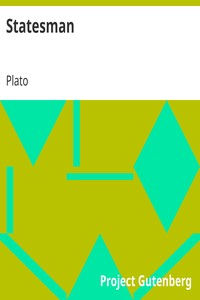Statesman by Plato
"Statesman" by Plato is a philosophical dialogue written during the late 4th century BC. The text explores the nature of statesmanship and the qualities that define a true leader, contrasting these ideals with the various forms of government and societal roles. Through a conversation featuring Socrates and other philosophical figures, Plato seeks to uncover the essence of political science and its application to governance, making compelling arguments about knowledge, power, and the
ideal state. At the start of "Statesman," the dialogue opens with Socratic questioning about the classification of knowledge and the nature of a statesman. The Eleatic Stranger suggests that sciences can be divided into two main categories: theoretical and practical. As the conversation unfolds, the Stranger and Younger Socrates deliberate on the distinctions between various forms of governance and their respective practitioners, ultimately aiming to define what true statesmanship entails. The dialogue is structured around dialectical reasoning and explores various analogies, such as weaving, to illustrate the complexities of political leadership and the art of governing, setting the stage for a deeper philosophical inquiry into the essence of effective rule. (This is an automatically generated summary.)
Read or download for free
| How to read | Url | Size | |||
|---|---|---|---|---|---|
| Read now! | https://www.gutenberg.org/ebooks/1738.html.images | 287 kB | |||
| EPUB3 (E-readers incl. Send-to-Kindle) | https://www.gutenberg.org/ebooks/1738.epub3.images | 154 kB | |||
| EPUB (older E-readers) | https://www.gutenberg.org/ebooks/1738.epub.images | 156 kB | |||
| Kindle | https://www.gutenberg.org/ebooks/1738.kf8.images | 271 kB | |||
| older Kindles | https://www.gutenberg.org/ebooks/1738.kindle.images | 258 kB | |||
| Plain Text UTF-8 | https://www.gutenberg.org/ebooks/1738.txt.utf-8 | 247 kB | |||
| Download HTML (zip) | https://www.gutenberg.org/cache/epub/1738/pg1738-h.zip | 152 kB | |||
| There may be more files related to this item. | |||||
Similar Books
About this eBook
| Author | Plato, 428? BCE-348? BCE |
|---|---|
| Translator | Jowett, Benjamin, 1817-1893 |
| Title | Statesman |
| Note | Wikipedia page about this book: https://en.wikipedia.org/wiki/Statesman_(dialogue) |
| Note | Reading ease score: 63.5 (8th & 9th grade). Neither easy nor difficult to read. |
| Credits | Produced by Sue Asscher, and David Widger |
| Language | English |
| LoC Class | JC: Political science: Political theory |
| LoC Class | PA: Language and Literatures: Classical Languages and Literature |
| Subject | Classical literature |
| Subject | Political science -- Early works to 1800 |
| Category | Text |
| EBook-No. | 1738 |
| Release Date | May 1, 1999 |
| Most Recently Updated | Jan 16, 2013 |
| Copyright Status | Public domain in the USA. |
| Downloads | 921 downloads in the last 30 days. |
| Project Gutenberg eBooks are always free! | |


